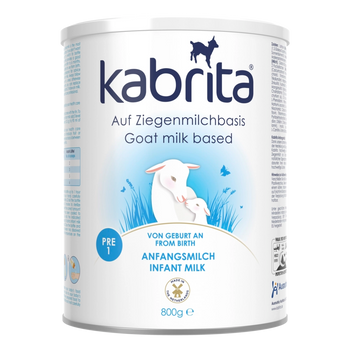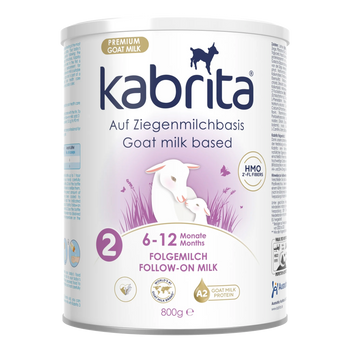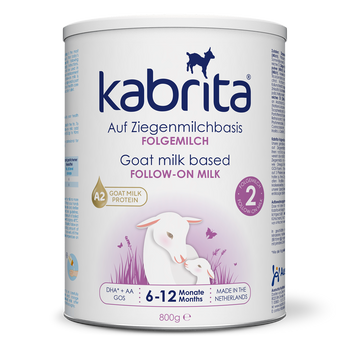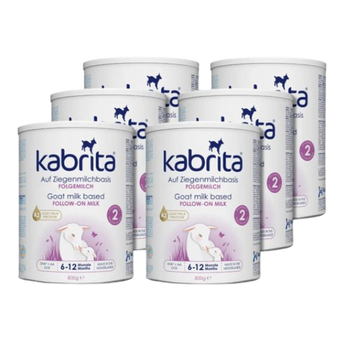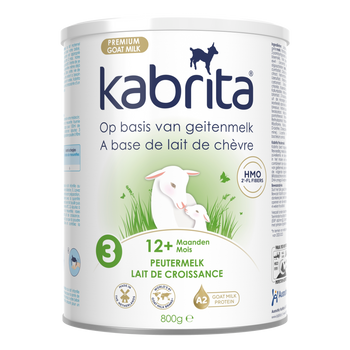FAQ Category: Ingredients
No fluoride has been added to the formulas. The formula does contain very low amounts of fluoride contributed by the natural formulation of the ingredients.
Glucose syrup is used in Kabrita goat milk formula as a 'carrier' for important nutrients, such as vitamins, minerals and dietary fibres. These are essential ingredients for modern formulas, but unfortunately, they are extremely difficult to add to the formula without using glucose syrup as a carrier. By dosing them using a carrier agent, these ingredients can be added in the right amount and distributed through the powder correctly. This explains why our formulas contain a very small amount of glucose syrup. Although it is not always mandatory to state 'glucose syrup' as an ingredient on the tin, we believe in transparency and want to offer our customers full and complete information.
No, Kabrita does not contain additives such as sugar, artificial aroma, colorants and/or flavouring.
Goat milk naturally contains nucleotides. Nucleotide are part of DNA. They play an important role in energy storage.
Every mother is free to make the best choices regarding how to feed her child as she thinks best. The presence or absence of sugar in food is a frequently made and conscious consideration. Sugar must be stated on the formula packaging. It is listed as an ingredient on the tins of Kabrita goat milk formula. This does not, however, mean that granulated sugar has been added to Kabrita goat milk formula. Sugar is an umbrella term for all the "short chain” carbohydrates, of which lactose ("milk sugar") is the most important in both breastfeeding and Kabrita goat milk formula. These carbohydrates are converted into the energy your baby needs for healthy growth and development during this phase. To ensure your baby is given enough carbohydrates, the minimum amount of carbohydrates in formula has been established by legislation. In Kabrita the amount of "sugar" is formed by lactose and a small amount of glucose syrup.
No, the goat milk that we use for our formula is not organic. Due to the limited availability of organic goat milk, it is not possible to produce our globally available formulas using fully organic goat milk.
Fish oil is very rich in DHA, the polyunsaturated omega-3 fatty acid found in the brain and retinal tissue.
As well as being an important source of energy, fat is also needed for functions such as maintaining body temperature and keeping the skin and hair healthy. The addition of plant-based oils to Kabrita goat milk formulas ensures the baby is given the right amount of fatty acids in the optimum composition. Palmitic acid, which is an important fatty acid for babies, is present in breast milk over the world. Because (plant-based) palm oil is also rich in palmitic acid, we decided to add palm oil to our formula.
DHA (docosahexaenoic acid) is a long chain of polyunsaturated omega-3 fatty acids and is found in the brain and eye tissue.
FOS and GOS are fructooligosaccharides and galactooligosaccharides; also known as prebiotic fibres. Prebiotic fibres promote the growth of beneficial bacteria in the large intestine, inspired by the effect of breast milk in the large intestine.
Most of the salt found in Kabrita is from the sodium that is naturally present in goat milk. Sodium is required by the human body for various functions such as the fluid balance and muscle contraction. In order to comply with nutritional requirements, a minimum amount of sodium must be present in infant formula.
No. Genetically modified organisms (GMOs) are not used in the production of Kabrita. Strict European legislation regulating infant nutrition prohibits the use of genetically modified ingredients (GMO's) in formula. This means that, in addition to Kabrita, no GMOs are used in the production of all other bottle feeds sold within Europe.
